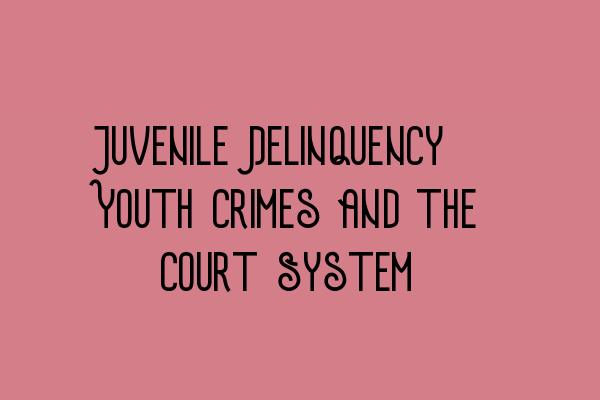Juvenile Delinquency: Youth Crimes and the Court System
When it comes to the topic of law and criminal justice, one area that demands attention is juvenile delinquency. Youth crimes can have significant impacts on individuals, families, and communities. Understanding the court system’s approach to dealing with juvenile offenders is crucial for ensuring a fair and effective justice system for all involved. In this article, we will explore the important aspects of juvenile delinquency, the court system’s role in addressing youth crimes, and the potential solutions that can help prevent juvenile offenders from becoming repeat offenders.
The Definition of Juvenile Delinquency
Juvenile delinquency refers to criminal behavior committed by individuals who are under the age of 18. These offenses can range from minor offenses such as theft or vandalism to more serious crimes like assault or drug-related offenses. It is important to note that the primary focus of the juvenile justice system is rehabilitation rather than punishment, as the aim is to divert youth offenders away from a life of crime and towards becoming responsible members of society.
If you want to learn more about criminal law, you can check out SQE 1 Preparation Courses.
The Court System’s Approach to Juvenile Delinquency
The court system recognizes that dealing with juvenile offenders requires a different approach than that used for adult offenders. Instead of following the same procedures applied to adult criminals, the court system focuses on rehabilitation and addressing the underlying issues that may have contributed to the delinquent behavior.
When a juvenile offender is arrested or charged with a crime, they are typically brought to a juvenile court rather than a criminal court. In the juvenile court, the judge has the authority to determine the most appropriate course of action for the offender, considering factors such as the seriousness of the offense, the offender’s age, and the offender’s prior criminal history, if any.
One of the key principles of the juvenile court system is the concept of confidentiality. The court proceedings and records of juvenile offenders are typically sealed to protect their privacy and future prospects. This approach aims to provide the opportunity for juvenile offenders to re-enter society without the stigma of their past actions following them indefinitely.
If you are interested in practicing criminal law, you may want to take a look at SQE 2 Preparation Courses.
Preventing Juvenile Delinquency
While the court system plays an essential role in addressing juvenile delinquency, prevention should always be a priority. The earlier intervention occurs, the more effective it tends to be in diverting youth away from criminal activities. Schools, families, and communities all have a part to play in preventing juvenile delinquency.
Educational institutions can implement programs that promote positive behavior and teach conflict resolution skills. By providing a supportive environment and teaching essential life skills, schools can help guide students towards productive paths.
If you are preparing for the SQE exams, make sure to utilize resources such as SQE 1 Practice Exam Questions and SQE 1 Practice Mocks FLK1 FLK2 for comprehensive preparation.
Family dynamics can significantly influence a child’s behavior. Providing support and guidance within the family unit is crucial to preventing juvenile delinquency. Strong family bonds, open communication, and consistent discipline can help children develop a sense of responsibility and make better choices.
Conclusion
Juvenile delinquency is a complex issue that calls for a comprehensive and compassionate approach. By understanding the court system’s role in addressing youth crimes and focusing on prevention, we can work towards creating a society where all young individuals have the opportunity to thrive. Instead of treating juvenile offenders as irredeemable, we must strive to provide them with the necessary support and guidance to help them lead productive and law-abiding lives.
For more information about SRA SQE exams and exam dates, visit SRA SQE Exam Dates.
